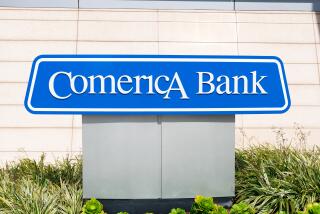22 Credit Unions Get Federal Insurance
- Share via
WASHINGTON — Federal regulators said Thursday that they will insure 22 credit unions in Rhode Island’s banking crisis, but refused coverage to 11 larger institutions because they have bad loans on their books.
After scrutinizing the institutions’ financial data, regulators found that the 11 credit unions, with total assets of $1 billion, had a high proportion of non-performing commercial real estate and other loans.
The National Credit Union Administration, a federal agency that insures 95% of the nation’s credit unions, said the solvency of some of the 11 was in question.
Industry sources said they could face liquidation, which could force Rhode Island to cover depositors’ losses.
“There will be losses, and then the question is who will pick up the tab,” said Bert Ely, a consultant to financial institutions.
Ely said there would be pressure on the state to pay off depositors should any institutions fail.
On Tuesday, 35 privately insured credit unions, seven loan and investment companies and three banks were ordered shut by Rhode Island Gov. Bruce Sundlun until they secured federal deposit insurance.
Sundlun declared a bank emergency because the Rhode Island Share & Deposit Indemnity Corp., the private fund guaranteeing 300,000 deposits totaling $1.7 billion at the institutions, was on the verge of collapse in the wake of a bank failure last year.
The 22 institutions that will receive federal insurance have assets of $381 million. They should be able to reopen their doors soon, the credit union administration said.
Thirty-three Rhode Island credit unions applied to the NCUA for federal deposit insurance, while five banks, with assets of $400 million, asked the Federal Deposit Insurance Corp. for insurance coverage.
A spokesman for the FDIC, which insures bank deposits, said the agency has not determined whether it will insure the five banks, but said he expected a decision fairly soon.
The near-collapse of the Rhode Island private insurance fund comes at a time when the nation’s banking system is under stress and the FDIC has seen its resources shrink to their lowest level in history.
The FDIC has said it will insure the banks only if they are healthy. “Obviously, given the problems here, there will be some institutions that will not qualify,” FDIC Chairman L. William Seidman said in an interview published Wednesday.
In contrast to the FDIC, the NCUA fund is considered in good shape. “The credit union insurance fund is absolutely safe and sound and has never operated at a loss,” said Roger Jepsen, NCUA chairman.
The $2-billion fund has about $1.30 for each $100 in deposits, more than the minimum level considered safe, he said.
Jepsen predicted that the situation in Rhode Island might spur officials in other states to require privately insured institutions to seek federal insurance.
There was evidence of this after private deposit insurers for savings and loan associations collapsed in Ohio and Maryland in 1985, he noted.
There are nine other private insurers, which cover 1,462 credit unions with total assets of $20.8 billion in 20 states, said Chip Filson, president of Callahan & Associates, a Washington-based consulting firm that specializes in credit unions.
In Rhode Island, the $25-million RISDIC fund, which also insured investment companies, was severely strained by the failure of a single bank last October.
Rhode Island allowed its state-chartered institutions more latitude than federal regulators or most other states would have done, and this contributed to its problems, industry sources said.
More to Read
Sign up for Essential California
The most important California stories and recommendations in your inbox every morning.
You may occasionally receive promotional content from the Los Angeles Times.













